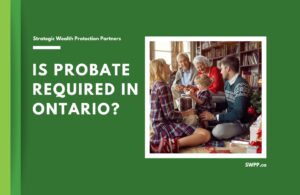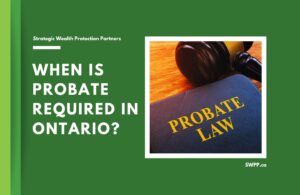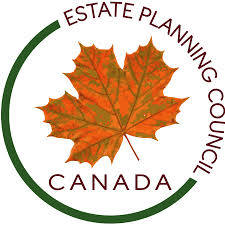Written by Ron Cooke, President & Founder of Strategic Wealth Protection Partners in Ontario, CEA®, Member of the Estate Planning Council Canada
Do Beneficiaries Pay Tax on Inheritance in Canada?
Q: Do beneficiaries pay tax on inheritance in Canada?
A: In Canada, there is no direct inheritance tax, but beneficiaries may still face taxation depending on the type of assets they inherit.
Understanding how estate taxes work can help maximize your inheritance and minimize unexpected tax burdens. Keep reading to find out more about how inheritances are really taxed in Canada.

Who pays tax on an inheritance in Canada?
Beneficiaries do not pay tax simply for receiving an inheritance in Canada.
However, the estate is responsible for settling any taxes before distributing assets. This includes capital gains tax on investments and real estate, income tax on RRSPs and RRIFs, and probate fees in certain provinces. If these taxes are not properly planned for, beneficiaries may receive a smaller inheritance than expected.
How do estate taxes work in Canada?
Canada does not have an estate tax, but when someone passes away, their estate must pay taxes before assets are distributed.
The CRA considers all capital assets—such as real estate and investments—to be sold at fair market value at death, triggering capital gains tax on any appreciation. Registered accounts like RRSPs and RRIFs are treated as income, unless they are rolled over to a surviving spouse or dependent child. Proper estate planning can reduce these tax liabilities.

Do you have to report inheritance money to the CRA in Canada?
No, beneficiaries do not have to report an inheritance as income to the CRA.
However, if the inherited assets generate income—such as dividends from stocks, rental income from inherited property, or interest from inherited cash—this income must be reported and taxed.
Additionally, selling an inherited property or investments may result in capital gains tax on any appreciation after the inheritance date.
When you inherit a house and sell it, is it taxable in Canada?
If the inherited house was the deceased’s principal residence, there is no capital gains tax upon inheriting or selling it.
However, if it was a rental property, cottage, or investment property, the estate pays capital gains tax on its increase in value up to the date of death. When a beneficiary sells the property later, any increase in value from the inheritance date to the sale date is subject to capital gains tax on 50% of the profit.
Can life insurance be used to pay your “death taxes?”
Yes, life insurance is one of the most effective ways to cover estate taxes.
Life insurance proceeds are tax-free and paid directly to named beneficiaries, bypassing probate and estate taxes. Many Canadians use life insurance to cover capital gains tax, RRSP/RRIF tax liabilities, and other estate costs, ensuring their heirs receive the full value of their inheritance without needing to sell assets.
Can trusts be used to reduce taxes on an estate?
Yes, trusts are a powerful tool for minimizing estate taxes.
Assets placed in a living trust (inter vivos trust) do not go through probate, reducing probate fees and legal delays. Alter ego trusts and joint partner trusts, available to those 65 and older, defer capital gains tax until the death of the last surviving spouse.
Trusts also allow for controlled wealth distribution, protecting beneficiaries from creditors, divorce settlements, and poor financial decisions.
Avoid Ontario’s Hefty “Death Tax”
While Ontario doesn’t have a direct estate tax on your total net worth, income tax on capital gains and deemed dispositions can have a significant impact on your estate. These taxes can dramatically reduce the wealth you pass on to your loved ones.
For instance, assets like real estate (excluding your principal residence) and non-registered investments are deemed sold at fair market value upon death. The resulting capital gains are usually taxed at Ontario’s highest marginal tax rate, which exceeds 53.53% (2024).
Here’s an example: If you have an RRSP or RRIF worth $1,000,000, the government could take $535,000 in taxes upon your death. That’s more than half of your hard-earned savings—gone to taxes, not your family. And that’s before factoring in additional costs like probate fees, executor fees, legal fees, and accounting fees. What will be left for your family?
Did you know that some of your assets may even face double taxation? Without proper planning, the total financial burden on your estate could be staggering.
Simple Steps Can Save You Millions
With our Living Estate Plan, you can not only minimize taxes but also protect and even grow your wealth. Our proven strategies help shield your assets, ensuring more of your legacy goes to your loved ones—not the government.
Discover How to Minimize Taxes and Secure Your Legacy
Did you know that without a solid estate plan, taxes and fees in Ontario could claim a significant portion of your wealth?
If you’ve worked hard to build your business, investments, and properties, protecting your legacy for your loved ones is critical. At Strategic Wealth Protection Partners, we specialize in helping high-net-worth individuals in Ontario secure their financial futures.
Our Living Estate Plan is designed to:
- Reduce estate taxes and probate fees.
- Simplify wealth transfer to your loved ones.
- Reflect your values and priorities in every detail.
Your Legacy Matters
With our personalized guidance, we’ll help you navigate options like Living Trusts to protect your assets and ensure your family’s peace of mind. Contact us today to book your Living Estate Plan Consultation and take the first step toward a secure future.
Schedule a Living Estate Plan Consultation
Planning your legacy is about more than numbers—it’s about ensuring your family remembers you and your values are honoured for many years to come.
Estate planning and trusts can feel overwhelming, especially if it’s your first time. That’s why we’re here.
With our simple, 5-Step Living Estate Plan, we make the process easy, helping you create a comprehensive estate plan or trust that protects your assets from taxes and probate fees while preserving your legacy. Tools like The Final Word Journal capture your story, wishes, and essential details like accounts and end-of-life plans, ensuring your family has clarity and comfort.
Take the first step today—schedule a consultation call and give your family the ultimate gift: peace of mind and the assurance they were always your priority.
Read More
If you’re starting your estate planning process, you may find these articles helpful:
- How to Avoid Estate Tax in Canada
- How Much Is an Estate Taxed in Canada?
- What Is the Tax Rate for Trusts in Canada?
- How to Avoid Estate Tax in Ontario
About the Author
RON COOKE, PRESIDENT & FOUNDER OF STRATEGIC WEALTH PROTECTION PARTNERS

With over 30 years in financial services, I’ve seen the challenges families face when a loved one passes—lost assets, unnecessary taxes, and emotional stress. That’s why I created the Living Estate Plan, a comprehensive process to protect assets, eliminate estate and probate fees, and create legacies that are remembered for many years to come.
This plan ensures your family receives not just your wealth, but a meaningful reminder of your care and love. Tools like The Final Word Journal capture your story, wishes, and essential details, offering clarity and comfort during difficult times.
Your final gift should be more than money—it should be peace of mind, cherished memories, and an organized estate.
Schedule a Call
Schedule a 30-minute consultation call with Strategic Wealth Protection Partners.
Click HERE to schedule a consultation.









